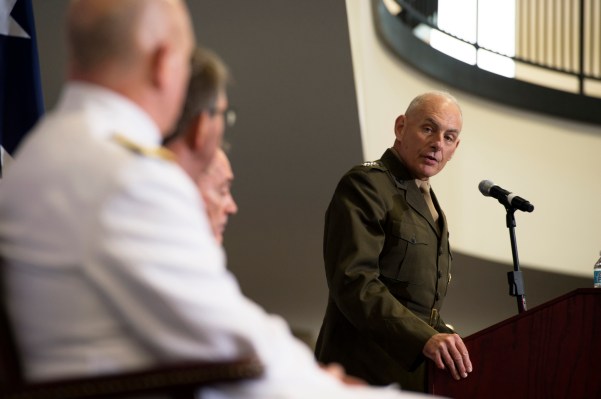In a Senate hearing described as a “lovefest” by one attendee, General John F. Kelly testified about his nomination to become the fifth secretary of the Department of Homeland security.
The relatively concise and often openly warm hearing got underway as Missouri Senator Claire McCaskill thanked Kelly for his prompt compliance: Unlike some of the other nominees, Kelly got his Office of Government ethics paperwork in on time.
Given his tenure as the second-longest serving general in the armed forces, Kelly spent very little time in the private sector compared to Trump’s other picks—a more billionaire-heavy lot than your average cabinet. Kelly, a more traditional nominee by most accounts, is the former head of U.S. Southern Command, a military division encompassing the Caribbean, Central America and South America.
The hearing focused heavily on the U.S. drug epidemic and border security but still managed to touch some tech-adjacent topics. We’ve collected Kelly’s comments on those here.
On drones for border security, in response Arizona Senator John McCain’s questions about technology’s role in border patrol:
“A physical barrier in and of itself… will not do the job. It has to be really a layered defense. I believe the defense of the Southwest border really starts 1500 miles south.”
In a departure with President-elect Trump, Kelly dismissed the idea of building a wall, instead suggesting that strengthening a partnership with Peru and other South American countries to “give them more of what they need” could solve many U.S. border issues.
When asked again about technology, Kelly endorsed the use of “observation devices mounted in certain terrain features, UAVs for sure, sensors, perhaps in places where the wall can’t be built or won’t be built any time soon.”
“If you were to build a wall from the Pacific to the Gulf of Mexico, you would still have to back that wall up with patrolling by human beings, sensors, observation devices,” Kelly said.
On countering threats to cybersecurity:
In another notable departure with Trump, Kelly stood behind intelligence reports on Russian interference in the U.S. election, stating that he accepted this information with “high confidence.”
On America’s cybersecurity capabilities today:
“My job as a military person [is to] know what our capabilities are. I also know that three, four, five years ago we talked that the U.S. wouldn’t have a peer competitor in cyber for… 20 years. Now we know we have some pretty darn close-to-peer competitors” in cyber warfare.”
On working with the private sector on cybersecurity:
Kelly said that the commercial world could be useful in assessing federal cybersecurity and issuing a performance “report card.” There’s unbelievable talent out there,” Kelly said. “Everyone realizes that working together makes an awful lot of sense.” He endorsed “more cooperation amongst the private sector and the federal and state sector” though did not specify what kind of cooperation or contracting his comments suggested.
“I think the commercial world, the civilian world, is as much as a player in this as [the government].”
On the cost of privacy in state surveillance:
In response to a question from Kentucky Senator Rand Paul, Kelly indicated that he does not support DHS collecting bulk data: “I’m not for the collection or the mass collection of data on people” and instead preferred the “the traditional route” of seeking information on specific individual targets.
On indefinite detainment:
“I’m pretty committed to the constitution.”
On this and many other questions, Kelly emphasized that while he was not a lawyer, he would “follow the law.” He went on to suggest that he did not agree with the legal precedent set by Korematsu v. U.S. that upholded detaining U.S. citizens during times of war.
On building a Muslim registry:
“I don’t think it’s ever appropriate to focus on something like religion as the only factor… I don’t agree with registering people based on [ethnicity] or religion or anything like that.”
On the nature of cyberattacks against critical infrastructure:
“The problem as we discussed is it’s constant, it’s relentless, it’s from nation states, it’s from mafia-type organizations and it’s from vandals… [the] threat changes so rapidly we can’t keep up with it—we have to find a way to keep up with it.”
On DHS coordinating with the armed services and intelligence community:
“My sense is that there’s just not enough interaction. Obviously we can’t do certain things because of laws. But laws can be changed if need be. Ten years ago when we first started talking about this we were probably ahead of the problem… now we’re behind the problem.”
On U.S. cyber vulnerability:
“I think we could very easily suffer a seriously catastrophic cyber event.”
